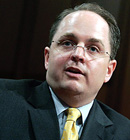
As the controversy over the firings of eight U.S. Attorneys reached a slow boil in mid-March, Attorney General Alberto Gonzales held a press conference placing the responsibility squarely on the shoulders of his former chief-of-staff, Kyle Sampson, who’d resigned the day before. It was Sampson, Gonzales said, who headed up the process and he claimed he “was not involved in seeing any memos, was not involved in any discussions about what was going on.” He added, “Obviously, there are going to be decisions made that I’m not aware of.” Maybe so, but evidence is mounting that Gonzales certainly had a hand in this one.
Though Gonzales has attempted to keep his distance from the scandal — at one point fleeing a press conference to avoid fielding questions on it — day by day he moves closer to the eye of the storm. Testifying today before the Senate Judiciary Committee, Sampson, who brought to mind a younger and more diminutive Karl Rove, implicated Gonzales further. “I don’t think the Attorney General’s statement that he was not involved in the process is accurate,” he said. In fact, Sampson testified, the two of them had talked about replacing the prosecutors in January 2005, when discussions on the matter were first being held, and from “time to time” after that. “The decision makers in the case were the Attorney General and the counsel to the president,” Harriet Miers, he said. “I and others made staff recommendations but they were approved or signed off by the principals.”
Sampson also contradicted Gonzales’ claim that he withheld key information from deputy attorney general Paul McNulty and principal deputy attorney general William Moschella, possibly causing them to offer incomplete and misleading testimony when they appeared before Congress on February 6 and March 6, respectively. According to Sampson, Gonzales’ statement was “inaccurate if it implies that I intentionally misled Congress.”
Sampson’s testimony was highly anticipated on the Hill, holding the key, it would seem, to what the Attorney General’s role in the firings truly was and whether or not these prosecutors were replaced for purely political reasons. Gonzales, who testified on the firings on January 18, will be back on the hot seat on April 17 to explain the “discrepancies” in his story, as a spokesperson for Senator Patrick Leahy (D-Vt.), chairman of the Judiciary Committee, put it. Senator Arlen Specter (R-Pa.), for one, seemed eager to get Gonzales under oath and “eyeball to eyeball.”
At this point, Gonzales’ fate seems uncertain. If he did in fact make misleading statements about his role in the controversy, he did so in front of the press. Yet, Gonzales is not completely in the clear. Should Congress determine that he was intentionally lying, it remains a remote possibility that he could be charged for obstructing a congressional investigation. When I called the Senate Judiciary Committee to inquire whether it might consider taking action of this kind, a spokesperson said she was unaware of an effort to do so. She did, however, bring up the case of J. Steven Griles, the former Interior Department official and Abramoff lackey, who recently pled guilty for doing just that.















